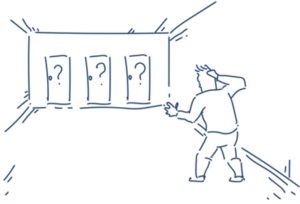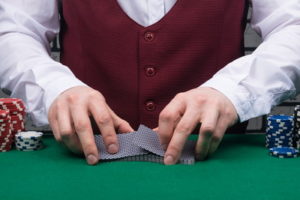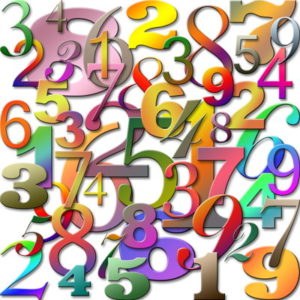 A lot of bettors, as with people in everyday life, think that if they make a personal choice over something then it is more likely to have success. Take a lottery player that picks their own numbers. Many would rather keep their own ticket with a line that they had chosen than swap it for a ticket with five Lucky Dips.
A lot of bettors, as with people in everyday life, think that if they make a personal choice over something then it is more likely to have success. Take a lottery player that picks their own numbers. Many would rather keep their own ticket with a line that they had chosen than swap it for a ticket with five Lucky Dips.
Someone who is throwing the dice on a craps table believes that they have more control and are therefore more likely to win their bets than when they’re betting on someone else’s throw. This sense of being in control can trick people in to think they’ve made a choice.
Oftentimes, there is no choice other than whether to bet or not. Yet by making some sort of personal choice on small matters, people become attached to the bets that they’re placing and feel that they’re more likely to win than if the power is in someone else’s hands.
There is, as you might imagine, a strong link between the psychology of personal choice and the illusion of knowledge and control. People think that if they spin the ball on the roulette wheel then they’ll stand a better chance of winning, but the reality is that they are no more likely to win than if a croupier spins it.
What Is Personal Choice In Gambling?
 When we talk of personal choice in relation to betting and gambling, what we’re talking about is the idea that people are making a choice in what it is that they’re doing. If you went into a casino and were allowed to choose whether to be dealt cards in a game of blackjack by the casino dealer or to deal your own cards, which would you choose?
When we talk of personal choice in relation to betting and gambling, what we’re talking about is the idea that people are making a choice in what it is that they’re doing. If you went into a casino and were allowed to choose whether to be dealt cards in a game of blackjack by the casino dealer or to deal your own cards, which would you choose?
For most people, the answer is that they would choose to deal their own cards, believing that it would give them more choice and control over what was happening. The same cards would be dealt, but the psychology would feel different.
Similarly, what if you could spin the ball on the roulette wheel? The chances are that you’d feel more like you were the master of your own destiny than if a croupier span the ball, even though the physics and the randomness worked in exactly the same way irrespective of who it was that was releasing the ball around the wheel.
On the craps table, you’ll often find that people bet more when they have control of the dice. It is the same principle, feeling as though they are making a personal choice about how to throw the dice that they wouldn’t be able to make if someone else was throwing them.
A Determinant Of Illusory Control
![]() For psychologists, the fascination with personal choice is an easy one to understand. They see it as a ‘determinant of illusory control’. In other words, personal choice is something that gives people the impression that they have some control over the outcome of an event when no such control exists.
For psychologists, the fascination with personal choice is an easy one to understand. They see it as a ‘determinant of illusory control’. In other words, personal choice is something that gives people the impression that they have some control over the outcome of an event when no such control exists.
The most obvious example is with the lottery. If you pick your numbers, you have just as much chance of winning as someone who opts to select a Lucky Dip. To you, though, you will believe that you’re more likely to win because you’ve had an influence on the numbers you’ve chosen.
If you took a player that had picked their own numbers on a single lottery line and offered them a ticket with five Lucky Dips, most would not change their ticket. This is because they believe that the ticket featuring the numbers that they had chosen would be more likely to win than one with randomly selected numbers, in spite of the fact that the ticket with more lines on it would be more likely to win.
It is the power of personal choice that impacts the person’s psychology in refusing to swap tickets. For them, they feel as though they’re giving up something they’ve chosen and influenced in exchange for some entirely out of their control.
You Can’t Influence The Random
 In the vast majority of cases, the things that gamblers tend to bet on are completely and utterly random. Whilst playing Basic Strategy in blackjack can reduce the House Edge, as an example, it won’t change the fact that the cards being dealt are completely random.
In the vast majority of cases, the things that gamblers tend to bet on are completely and utterly random. Whilst playing Basic Strategy in blackjack can reduce the House Edge, as an example, it won’t change the fact that the cards being dealt are completely random.
How the ball on a roulette wheel bounces when it hits the diamonds on the wheel or the edges of the pockets is something that absolutely no one can control. When the lottery balls are entered into the machine, they bounce completely randomly and selecting your own numbers won’t alter that fact.
In spite of how much it might feel as though you’re making a difference, the truth is that you as a person can have precisely no impact on the outcome of something that is, by its very nature, random. Unless you have spent years perfecting the art of making the roulette ball do what you want, which is all but impossible anyway, or can somehow control which balls come out of a lottery machine, you’re not going to be able to have any sort of impact on something merely because it is you dealing the cards or getting the ball spinning on a roulette wheel.
How To Avoid Falling Foul Of The Personal Choice Fallacy

In order to bet more sensibly, the best thing that you can do as a punter is to completely forget any notion of being in control. You have to accept that your fate is in the hands of randomness.
You might win the lottery one day. You may see your number come up more than once whilst playing roulette. It is possible that you’ll win several hands in a row whilst playing blackjack. In reality, though, the entire system is set up to mean that the only people that win from betting and gambling are the casinos and bookmakers that take your bets and will always win in the long-run.
As a bettor, you will never have control and making personal choices around certain things makes no difference to that. The only choices you can make that will actually have an impact are what it is that you’re betting on and whether to even place the bet in the first place.
If you can choose not to place the bet, you can guarantee that you’ll have that money still in your bankroll. If you can roll the dice in craps, no such guarantee exists. That is the different between a personal choice that works in your favour and one that is completely and utterly out of your control.
